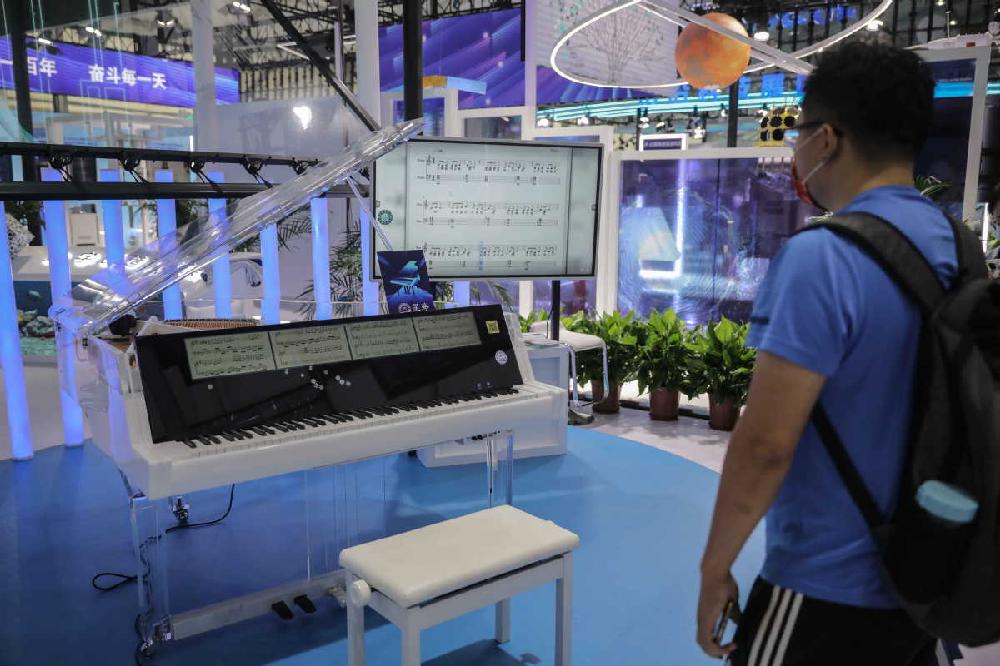
A visitor looks at a self-playing piano at the China Beijing International High-Tech Expo, which is part of the 2021 Zhongguancun Forum, on Sept 26, 2021. [Photo/IC]
Academy, Beijing promote need for countries to continue working together
The Chinese Academy of Sciences and the Beijing municipal government will continue to support international cooperation in frontier sciences, launch new scientific instruments and platforms and jointly tackle grand challenges facing humanity with the global scientific community, scientists and officials said on Sunday.
Around 100 experts and representatives from eight countries attended the 4th Conference on International Cooperation of Science Centers in Beijing on Sunday. The event was part of the 2021 Zhongguancun Forum, which opened on Friday and will run through Tuesday.
While addressing the forum's opening ceremony, President Xi Jinping said via video link that countries around the world should enhance openness and cooperation in science and technology to overcome key global issues.
In the future, China will strengthen global exchanges, proactively engage in the global innovation network and jointly promote basic research and the commercialization of research results, he said.
China will also find new engines for economic growth, enhance intellectual property protection, create a first-class innovation ecosystem, foster the principle of using science and technology for the greater good, improve global governance in science and technology and allow it to better benefit humanity.
Zhou Qi, vice-president of the academy, said on Sunday that over the past two years, the Beijing Huairou National Comprehensive Science Center in the capital's Huairou district has witnessed rapid development, characterized by the formation of a cluster of major scientific instruments and research facilities.
According to the National Development and Reform Commission, China has four major science centers: Beijing, Shanghai, Hefei in Anhui province, and the Guangdong-Hong Kong-Macao Greater Bay Area. Many cities-including Hangzhou in Zhejiang province, Nanjing in Jiangsu province, Wuhan in Hubei province and Jinan in Shandong province-have also submitted bids to host one of the nation's top science hubs.
In 2019, the academy and the Beijing municipal government launched the Global Cooperation Alliance of Science Centers with 15 partners from eight countries: China, Germany, United Kingdom, Switzerland, Spain, Poland, Netherlands and Sweden.
"The alliance has gathered the world's premier scientific infrastructure and research capacity, and it is supported by a highly efficient working mechanism and a healthy aspiration for cooperation among member nations," Zhou said.
Zhou said the academy will continue its support for the alliance and join hands with member nations to tackle crucial questions in frontier sciences, address global challenges and make greater contributions to achieving sustainable development and building a community with a shared future for humanity.
Sui Zhenjiang, vice-mayor of Beijing, said the capital will expand international cooperation by opening major scientific instruments to the world, launch new global scientific projects and attract more science and technology organizations and companies to set up headquarters in the city.
Beijing aims to create a first-class innovation ecosystem by supporting small and medium-sized technology companies, making it more convenient for foreign scientists to work and live in the capital, and establishing a favorable environment for researchers and companies to innovate and test their products, he added.
Liu Yinchun, deputy secretary-general of Beijing's municipal government, said that by 2025, the national science center in Huairou will finish most of its construction and begin full operations.
The district is set to host five major scientific instruments, including the High Energy Photon Source, China's first high-energy synchrotron radiation light source used for probing the microstructure of materials for basic research and engineering.
"By 2025, the center will see noticeable improvement in its ability to make original breakthroughs and innovations, and this will support the development of its surrounding regions and help transform China into an innovative nation," he said.
Wang Enge, an academician of the Chinese Academy of Sciences and the first chairman of the Global Cooperation Alliance of Science Centers, said the COVID-19 pandemic may have hindered international exchanges and cooperation in science and technology, but pragmatic collaboration is needed more than ever to address global challenges.
"The alliance aims to become a key global platform for dialogue and cooperation in science and technology. We will expand the membership of the alliance and carry out more practical cooperation," he said.
Ding Hong, secretary-general of the alliance and a researcher at the academy's Institute of Physics, said national science centers can provide powerful instruments and capable talent to tackle extremely difficult issues related to basic sciences and help solve key issues regarding humanity's survival and socioeconomic development.
"To address these challenges, we need more extensive international collaboration among these centers that are hosting the 'big tools of science'," he said.